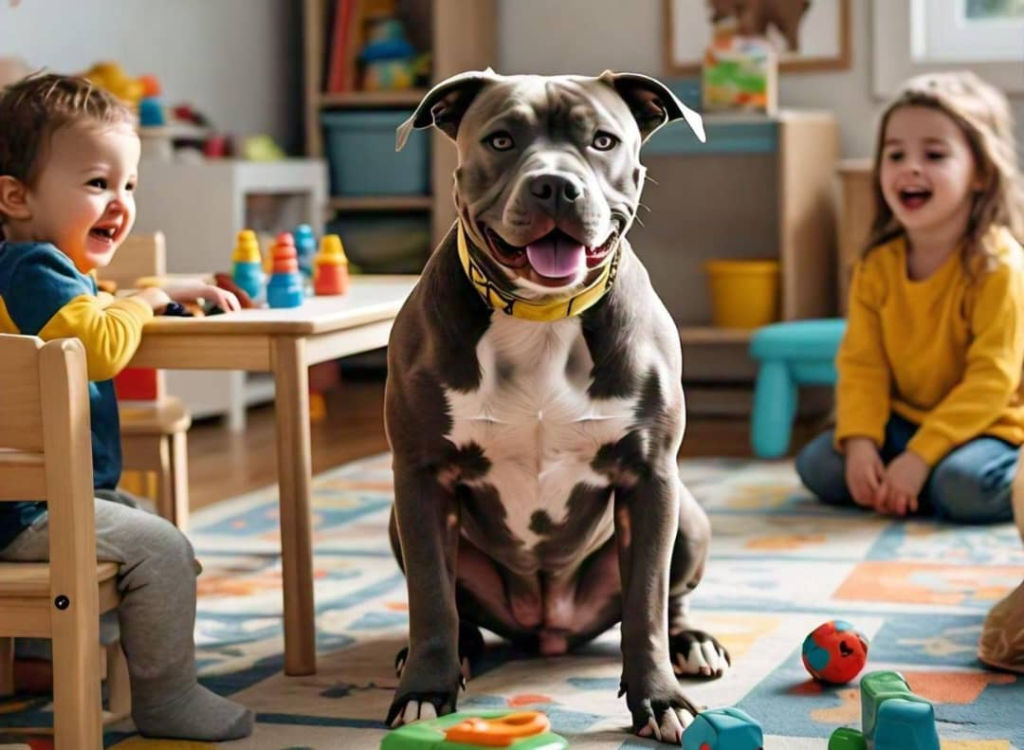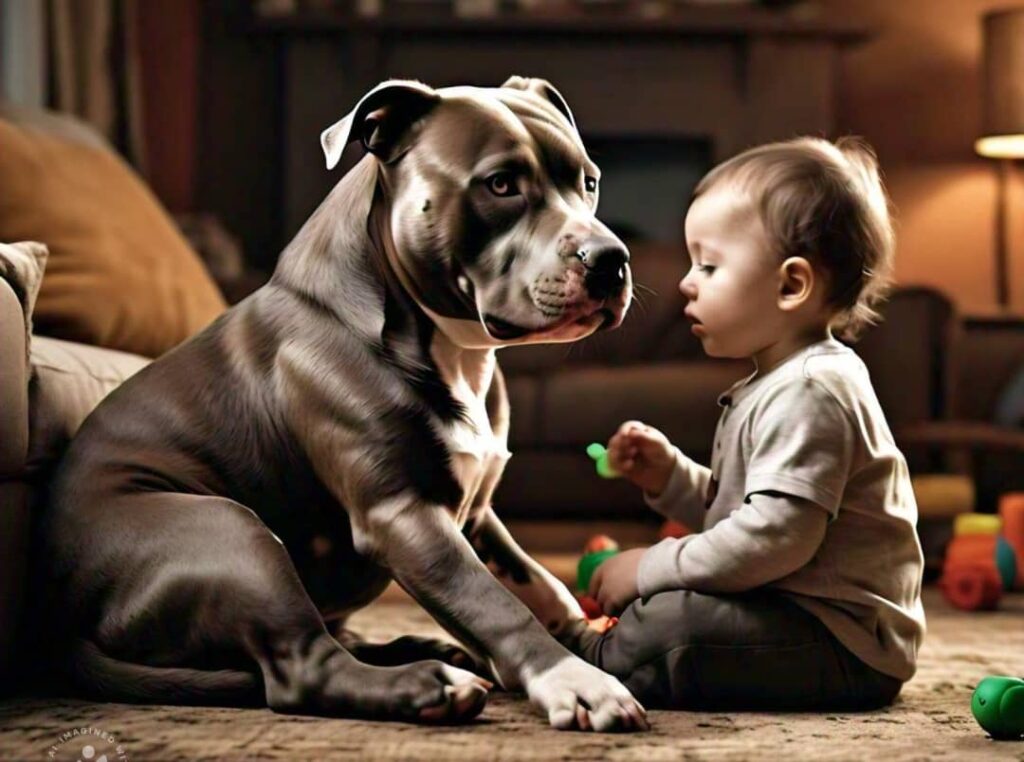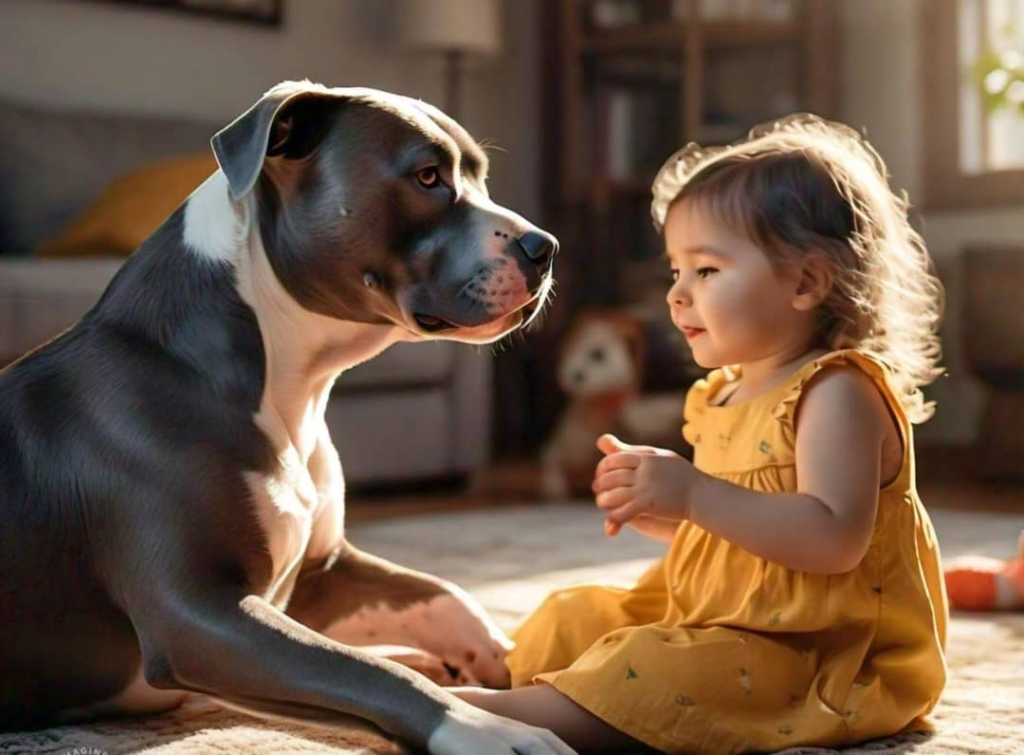Are pitbulls nanny dogs a myth? In a world where canine reputations are as varied as their breeds, one question persists: Are pit bulls truly nanny dogs, or merely misunderstood?
Pit bulls are often talked about in conflicting ways. Some people see them as loyal friends and protectors, while others fear them because of stories in the media.
One popular belief is that pit bulls were once known as “nanny dogs,” praised for their gentle care of children. But is this true? This idea raises important questions about the real nature of pit bulls and how they are perceived in society.
By exploring their history, behavior, and public image, we can better understand these dogs and challenge common misunderstandings about them. Let’s dive in.
Debunking the “Nanny Dog” Myth

The idea that pitbulls are “nanny dogs” is a myth that has been proven wrong. These dogs have a complex history, but being gentle with children is not their true nature. This myth has hurt how people see pitbulls and has made owning them harder.
Origins and Harm of the Myth
Back in the 1800s, pit bulls were known for their rough jobs like bear and bull baiting. When those got banned in Britain in 1835, folks turned to dog fighting, which was illegal but still happened. When pit bulls came to the U.S. later on, they were called “American Pit Bull Terriers” and did all sorts of jobs, such as herding.
The idea that pit bulls were nanny dogs started in the 1900s during World Wars I and II, when they became mascots and pets. But here’s the thing: This story caused problems because some folks thought their pit bulls could handle anything, like kids climbing on them or grabbing their food. That misunderstanding sometimes led to dogs biting people.
Setting Pitbulls Up for Success
To keep pit bulls safe and happy around kids, it’s crucial to give them proper socialization, training, and clear rules.
Responsible pit bull owners should know their background, understand how aggression can manifest in pit bulls, and ensure they get along well with others.
By debunking the “nanny dog” myth, we can support pit bulls and reshape public perceptions about these wonderful dogs.
The Reputation of Pitbulls
Pitbulls have often been seen as aggressive and dangerous. But these ideas about their aggression and myths, such as “lockjaw,” are not true.
To truly understand pit bulls, we must explore their true nature. This can help us separate fact from fiction and see these dogs in a fair light.
Misconceptions About Aggression and Lockjaw
Many think pitbulls have a “lockjaw that won’t let them open their mouths. This isn’t true. Locked jaws are a rare medical issue, not a pitbull trait. Also, not all pitbulls are aggressive. Tests show they are often friendlier and more stable than many other dogs.
The bad image of pitbulls comes from the media and biased reports. These make people think they are always dangerous. But, how a dog acts depends a lot on how it is raised and trained, not just its breed.
Seeing pitbulls as “nanny dogs” should depend on the dog itself, not the breed. Many animal groups support laws that focus on responsible pet ownership over breed-specific rules.

The idea of pitbulls as “nanny dogs” comes from stories, photos, and media, not history books. Yet, pitbulls can be as loving and gentle as other dogs, proving the myths about them wrong.
Pitbull Temperament Traits
Pitbulls are often misunderstood, but they have many positive traits that make them great family pets. They are energetic, affectionate, and smart, always ready to please their owners.
Energetic, Affectionate, and Intelligent
Pitbulls have lots of energy, which is perfect for people who love to stay active. They enjoy playing and need lots of exercise. This makes them great for families who like to be active together.
They are also very affectionate and loyal. With the right training and socialization, they form strong bonds with their families, including kids. This has led to the myth that they are “nanny dogs,” but this is not true.
Pitbulls are smart dogs that learn quickly. They love to please their owners and can be trained for many jobs. They are great at search and rescue, detection, and even military work. With patience and consistency, they can become well-behaved pets.
It’s key to remember that a dog’s behavior, including a pitbull’s, comes from both their genes and their environment. To ensure pitbulls and their families are happy, they need proper socialization, training, and responsible care.
Are Pitbull Nanny Dogs

The idea that pitbulls are “nanny dogs” is a myth. In the early 1900s, pitbulls were common in American homes, but there’s no proof they were bred for child care. Other breeds, like the English Bulldog and Staffordshire Bull Terriers, were also called “nanny dogs.”
This myth has been harmful, making some think pitbulls can handle any child’s behavior. But no dog should be treated poorly by kids. It’s important to socialize, train, and set rules for the safety of both pitbulls and children.
People online and in pet communities spread the idea that pitbulls are nanny dogs. But, there’s no real proof for this. Originally bred for hunting in the 19th century, pitbulls became pets for working-class families. They were known for being loyal and protective.
Pitbulls are often seen as aggressive, but the facts are different. In 2012, 86.8% of American Pit Bull Terriers passed tests showing they were stable, friendly, and protective.
The media and their link to illegal dogfighting have hurt Pitbull’s reputation. This led to laws in some places that restrict or ban pitbull ownership. Critics say these laws unfairly target certain breeds without solving the real problems of dog attacks.
The idea that pitbulls are “nanny dogs” is not true. Their popularity in families has decreased due to the media, illegal activities, and wrong ideas about their nature. Being a responsible pet owner, training, and socializing are key to keeping pitbulls and children safe.
Pitbulls as Working Dogs
Pitbulls are often misunderstood, but they are truly capable working dogs. They have shown their skills in many roles, from search and rescue to military service. Their intelligence, trainability, and versatility prove they’re not aggressive or unsuitable for certain jobs.
Rescue, Military, and Detection Roles
Pitbulls have done well in many working roles. For example, a pitbull named Popsicle found the largest amount of drugs in Texas. This shows their great sense of smell and ability to detect.
Another pitbull, Sergeant Stubby, was the most decorated dog in military history. He served in 17 battles during World War I and was praised for his bravery and loyalty.
These stories show how pitbulls are versatile and not just unsuitable for certain jobs. They have proven their worth in search and rescue, military service, and drug detection. Often, they outperform other breeds in these areas.
Recently, pitbulls have gotten more positive media attention and are being adopted more. This shows people are learning about their abilities. As understanding of pitbulls grows, they’re being celebrated for their talents and the important roles they play.
Positive Media Portrayals
Positive media portrayals have been key in fighting the negative stereotypes of pitbulls. Movies and TV shows have shown pitbulls in a good light, challenging the idea that they are always aggressive and dangerous. For example, Petey from the “Our Gang” series was a pitbull known for his loyalty and gentleness towards the children.
Recent films like “The Little Rascals,” “John Wick,” and “Sgt. Stubby: An American Hero” have also highlighted the loving side of pitbulls. These films show that pitbulls can be great family pets and hardworking dogs. This goes against the harmful stereotypes that have followed the breed for years.
These positive media portrayals have helped promote responsible pitbull ownership and adoption. They’ve helped remove the bad reputation of the breed and shown that pitbulls are smart, energetic, and loyal. As more people see these positive images, the way the public sees pitbulls is changing. This leads to a better understanding and more compassion towards pitbulls.
The impact of these positive media portrayals is huge. They challenge the bad stereotypes about pitbulls and encourage responsible ownership and adoption. By showing the real nature of pitbulls, these media help shape a more accurate and caring public view of them. They are seen as working dogs and loving family members.
Conclusion
The idea that pitbulls are “nanny dogs” is a myth. This myth has been proven wrong by facts. In the 19th century, pitbulls were indeed family pets. But, there’s no solid proof they were bred for watching over kids.
This myth has caused harm. It made some owners ignore their pitbulls and let kids mistreat them. This can make the dogs more likely to bite.
Other myths about pitbulls also don’t stand up to the facts. They’re not as aggressive as people think. In fact, pitbulls are smart, loving, and excel in many roles, like sniffing out drugs or serving in the military. Movies and TV shows have also shown pitbulls in a positive light.To be a good pitbull owner, focus on socializing and training them. Set clear rules for their safety and yours. By understanding pitbulls for what they truly are, we can fight the wrong ideas about them. This leads to a kinder view of this breed.








104 comments
I don’t think the title of your article matches the content lol. Just kidding, mainly because I had some doubts after reading the article.
https://1xbetnplogin.com/
Thanks for sharing. I read many of your blog posts, cool, your blog is very good.
https://1xbetvnlogin.com/
I don’t think the title of your article matches the content lol. Just kidding, mainly because I had some doubts after reading the article.
Your point of view caught my eye and was very interesting. Thanks. I have a question for you.
https://forum.ginecologkiev.com.ua/viewtopic.php?f=10&t=26476
Thanks for sharing. I read many of your blog posts, cool, your blog is very good. https://accounts.binance.com/ka-GE/register?ref=RQUR4BEO
Your point of view caught my eye and was very interesting. Thanks. I have a question for you. https://accounts.binance.com/fr/register?ref=GJY4VW8W
https://dissertation-now.com/research-paper/
https://dissertation-now.com/essayassist-com/
https://pq.hosting/vps-vds-argentina-buenos-aires
I don’t think the title of your article matches the content lol. Just kidding, mainly because I had some doubts after reading the article.
https://moviemad.com.in/1xbet-register-india-guide-how-to-sign-up-in-2025/
Thanks for sharing. I read many of your blog posts, cool, your blog is very good.
Thank you for your sharing. I am worried that I lack creative ideas. It is your article that makes me full of hope. Thank you. But, I have a question, can you help me?
I don’t think the title of your article matches the content lol. Just kidding, mainly because I had some doubts after reading the article.
https://www.adsoftheworld.com/users/392ee443-65a7-407c-82d7-0504ebff0e62
Thanks for sharing. I read many of your blog posts, cool, your blog is very good.
burj khalifa tickets official website
Impacto mecanico
Sistemas de calibración: importante para el funcionamiento suave y productivo de las dispositivos.
En el mundo de la ciencia moderna, donde la efectividad y la seguridad del equipo son de gran significancia, los aparatos de equilibrado cumplen un función vital. Estos sistemas especializados están diseñados para ajustar y asegurar elementos giratorias, ya sea en equipamiento productiva, transportes de desplazamiento o incluso en aparatos hogareños.
Para los expertos en soporte de dispositivos y los técnicos, trabajar con dispositivos de balanceo es fundamental para garantizar el rendimiento estable y confiable de cualquier dispositivo móvil. Gracias a estas soluciones tecnológicas avanzadas, es posible reducir notablemente las sacudidas, el sonido y la carga sobre los rodamientos, extendiendo la vida útil de componentes caros.
Asimismo relevante es el función que cumplen los equipos de balanceo en la servicio al consumidor. El asistencia especializado y el reparación constante aplicando estos sistemas posibilitan proporcionar soluciones de excelente excelencia, incrementando la agrado de los consumidores.
Para los dueños de empresas, la contribución en estaciones de ajuste y dispositivos puede ser importante para incrementar la eficiencia y rendimiento de sus aparatos. Esto es sobre todo trascendental para los empresarios que manejan pequeñas y pequeñas emprendimientos, donde cada detalle es relevante.
También, los equipos de ajuste tienen una amplia aplicación en el área de la fiabilidad y el supervisión de estándar. Permiten localizar probables defectos, reduciendo reparaciones elevadas y problemas a los equipos. Incluso, los información obtenidos de estos equipos pueden emplearse para optimizar métodos y incrementar la exposición en motores de investigación.
Las zonas de utilización de los dispositivos de equilibrado cubren diversas industrias, desde la fabricación de bicicletas hasta el control ambiental. No afecta si se habla de enormes manufacturas productivas o limitados locales hogareños, los dispositivos de calibración son indispensables para promover un operación eficiente y libre de interrupciones.
Thanks for sharing. I read many of your blog posts, cool, your blog is very good.
https://www.kdpcommunity.com/s/profile/005at000002rztp?language=en_US
Thanks for sharing. I read many of your blog posts, cool, your blog is very good.
telegram virtual numbers>
аренда яхты в черногории с капитаном
segelboot kroatien chartern
Your point of view caught my eye and was very interesting. Thanks. I have a question for you.
https://soucial.net/palmacares
Can you be more specific about the content of your article? After reading it, I still have some doubts. Hope you can help me.
Mega onion
Mega онион
Мега даркнет
Mega онион
Мега даркнет
Mega онион
Mega онион
Mega даркнет
Мега онион
Мега онион
Mega darknet
Мега ссылка
Мега даркнет
Mega ссылка
Mega даркнет
Mega ссылка
Mega ссылка
Мега онион
Мега ссылка
Мега сайт
Мега ссылка
Mega онион
Мега даркнет
Mega onion
Мега даркнет
Мега онион
Can you be more specific about the content of your article? After reading it, I still have some doubts. Hope you can help me.
Thank you for your sharing. I am worried that I lack creative ideas. It is your article that makes me full of hope. Thank you. But, I have a question, can you help me?
Can you be more specific about the content of your article? After reading it, I still have some doubts. Hope you can help me.
I don’t think the title of your article matches the content lol. Just kidding, mainly because I had some doubts after reading the article.
Thank you for your sharing. I am worried that I lack creative ideas. It is your article that makes me full of hope. Thank you. But, I have a question, can you help me?
Mega даркнет
Your article helped me a lot, is there any more related content? Thanks!
Your point of view caught my eye and was very interesting. Thanks. I have a question for you. https://www.binance.info/pl/register-person?ref=YY80CKRN
Thank you for your sharing. I am worried that I lack creative ideas. It is your article that makes me full of hope. Thank you. But, I have a question, can you help me? https://www.binance.com/it/join?ref=S5H7X3LP
I don’t think the title of your article matches the content lol. Just kidding, mainly because I had some doubts after reading the article.
Harika bir yazı olmuş, teşekkürler. Özellikle Bursa’nın yoğun trafiğinde neyle karşılaşacağımız belli olmuyor. Olası bir durumda elimde kanıt olması için kaliteli bir bursa araç kamerası almayı düşünüyorum. Bu yazı karar vermemde çok yardımcı oldu.
Ben profesyonel olarak direksiyon sallıyorum ve güvenlik benim için ilk sırada. Şirket araçlarımızın hepsinde olduğu gibi şahsi aracıma da bir bursa araç kamerası taktırmak istiyorum. Hem caydırıcı oluyor hem de olası bir durumda sigorta süreçlerini hızlandırıyor.
Teslimat işi yaptığım için gün içinde sürekli farklı adreslere gidiyorum. Gittiğim yerlerde aracın güvenliği aklımda kalıyor. Sürekli kayıt yapan bir bursa araç kamerası ile artık gözüm arkada kalmayacak.
Aracımı genelde AVM otoparklarına veya cadde üzerine bırakıyorum. Döndüğümde küçük çiziklerle karşılaşmak can sıkıcı oluyor. Sanırım park modunda hassasiyeti yüksek bir bursa araç kamerası bu soruna çözüm olabilir.
Daha önce araç kamerası kullanma konusunda tereddütlerim vardı, gereksiz bir masraf gibi geliyordu. Ancak trafikte yaşananları gördükçe bir bursa araç kamerası taktırmanın lüks değil, ihtiyaç olduğunu anladım. Verdiğiniz bilgiler için teşekkürler.
Benim için en önemli kriter montajının kolay olması ve kabloların ortalıkta görünmemesi. Aracın orijinalliğini bozmayacak, estetik bir şekilde monte edilebilen bir bursa araç kamerası modeli var mıdır acaba? Bu konuda da bilgi verirseniz sevinirim.
Uludağ yolunda veya Mudanya sahilinde manzaralı sürüşler yapmayı çok seviyorum. Sadece güvenlik için değil, aynı zamanda bu güzel anları kaydetmek için de iyi bir bursa araç kamerası arıyorum. 4K çözünürlüklü modeller bu iş için harika olabilir.
Ehliyetimi yeni aldım ve trafiğe çıkmaya biraz çekiniyorum. Ailem, başıma bir şey gelirse kanıt olması açısından bir bursa araç kamerası almamı tavsiye etti. Yeni başlayanlar için kullanımı kolay bir model öneriniz olur mu?
Uludağ yolunda veya Mudanya sahilinde manzaralı sürüşler yapmayı çok seviyorum. Sadece güvenlik için değil, aynı zamanda bu güzel anları kaydetmek için de iyi bir bursa araç kamerası arıyorum. 4K çözünürlüklü modeller bu iş için harika olabilir.
Yazın aracımızla uzun bir Karadeniz turu planlıyoruz. Yol boyunca hem güvenlik hem de hatıra olması için yüksek depolama kapasitesine sahip bir bursa araç kamerası edinmek istiyoruz. Bu yazı tam zamanında karşıma çıktı.
Benzer bir ürün kullanıyorum ve kesinlikle herkese tavsiye ederim. Özellikle Organize Sanayi Bölgesi trafiğinde sabah ve akşam saatlerinde çok faydasını gördüm. İyi bir bursa araç kamerası gerçekten hayat kurtarabilir.
Ben profesyonel olarak direksiyon sallıyorum ve güvenlik benim için ilk sırada. Şirket araçlarımızın hepsinde olduğu gibi şahsi aracıma da bir bursa araç kamerası taktırmak istiyorum. Hem caydırıcı oluyor hem de olası bir durumda sigorta süreçlerini hızlandırıyor.
Apartmanımızın otoparkı çok güvenli değil, daha önce birkaç aracın aynası kırılmıştı. Sadece sürüş anı değil, park halindeyken de aracımı koruyacak bir bursa araç kamerası benim için en doğru çözüm olacak gibi görünüyor.
Apartmanımızın otoparkı çok güvenli değil, daha önce birkaç aracın aynası kırılmıştı. Sadece sürüş anı değil, park halindeyken de aracımı koruyacak bir bursa araç kamerası benim için en doğru çözüm olacak gibi görünüyor.
Benim için en önemli kriter montajının kolay olması ve kabloların ortalıkta görünmemesi. Aracın orijinalliğini bozmayacak, estetik bir şekilde monte edilebilen bir bursa araç kamerası modeli var mıdır acaba? Bu konuda da bilgi verirseniz sevinirim.
Yazınızda bahsettiğiniz G-sensör özelliği çok mantıklı. Allah korusun bir kaza anında o paniğe kapılıp kaydı korumayı unutabiliriz. Bu özelliği olan bir bursa araç kamerası bakacağım, aydınlattığınız için sağ olun.
Yazın aracımızla uzun bir Karadeniz turu planlıyoruz. Yol boyunca hem güvenlik hem de hatıra olması için yüksek depolama kapasitesine sahip bir bursa araç kamerası edinmek istiyoruz. Bu yazı tam zamanında karşıma çıktı.
Kasko yaptırırken bazı sigorta şirketlerinin araç kamerası olan araçlara indirim uyguladığını duymuştum. Bu konunun doğruluğunu araştırıp ona göre bir bursa araç kamerası yatırımı yapacağım. Hem güvenliğimizi hem bütçemizi korur.
Bilgiler için çok sağ olun. Ben özellikle park halindeyken de kayıt yapabilen bir model arıyordum. Nilüfer gibi kalabalık yerlerde park etmek büyük sorun. Sanırım benim için en ideali hareket sensörlü bir bursa araç kamerası olacak.
Herkese merhabalar, forumda dijital pazarlama konularını takip ediyorum. Ben Bursa’da peyzaj mimarlığı yapıyorum, özellikle Bademli ve Balat tarafında villa bahçeleri tasarlıyorum. Benim işim tamamen görsel. Yaptığım bahçelerin fotoğraflarını Instagram’a ve siteme yüklüyorum ama bu bana yeterince yeni müşteri getirmiyor. İnsanlar genelde ‘tavsiye’ ile geliyor. İnternetten ‘Bursa bahçe tasarımı’ diye aratan potansiyel müşterilere bir türlü ulaşamıyorum. Son zamanlarda anladım ki, sadece fotoğraf yüklemek yetmiyormuş. Siteme ‘Bursa için Kış Bahçesi Bakım İpuçları’ veya ‘Küçük Balkonlar İçin Peyzaj Fikirleri’ gibi yazılar eklemem gerekiyormuş. Bu Bursa SEO meselesi sadece anahtar kelime yazmaktan çok daha derinmiş. Aramızda benim gibi proje bazlı ve görsel odaklı iş yapıp da web sitesinden verim alan var mı? Blog yazmak gerçekten de varlıklı müşteri kitlesine ulaşmada etkili oluyor mu? Tecrübelerinizi merak ediyorum.
Selamlar, biz Bursa’daki organize sanayi bölgelerinde fabrika ve üretim tesisi temizliği hizmeti veriyoruz. Bizim müşteri kitlemiz son kullanıcı değil, direkt fabrika müdürleri veya satınalma sorumluları. Bu yüzden Instagram, Facebook gibi yerler bize pek müşteri getirmiyor. Web sitemiz var ama aramalarda nasıl çıkacağımızı bir türlü çözemedik. “Bursa endüstriyel temizlik” yazdığında rakipler çıkıyor. Sanırım bizim de “Gıda Üretim Tesislerinde Hijyen Standartları” veya “Otomotiv Fabrikalarında Zemin Temizliği Nasıl Yapılır?” gibi daha profesyonel ve teknik içerikler üretmemiz gerekiyor. Bu bursa seo olayı, B2B (firmadan firmaya) çalışanlar için daha farklı dinamiklere sahip sanırım. Bu konuda tecrübesi olanlardan tavsiye alabilirim.
Merhaba kitap kurtları! Ben Bursa’da küçük, bağımsız bir kitabevi işletiyorum. Büyük zincirlerle ve online devlerle rekabet etmenin ne kadar zor olduğunu tahmin edersiniz. Sadece kitap satmak yerine, bir kültür noktası oluşturmaya çalışıyorum. Web sitemde “Bursalı Yazarlar ve Unutulmuş Eserleri”, “Kitap Kulübü Okuma Listesi Önerileri” gibi yazılarla bir topluluk oluşturmayı deniyorum. Umarım bu tarz özgün içerikler, bursa seo sayesinde internet aramalarında da bir karşılık bulur ve dükkanıma daha fazla kitapseverin yolunu düşürür.
İyi çalışmalar, biz Bursa’daki firmalara insan kaynakları ve personel seçme/yerleştirme danışmanlığı veriyoruz. Bizim iki hedef kitlemiz var: işveren firmalar ve iş arayan adaylar. Sitemizde hem “Bursa’daki şirketler için doğru personel bulma teknikleri” gibi işverenlere yönelik hem de “Mülakatta dikkat edilmesi gerekenler”, “Bursa’daki iş ilanları” gibi adaylara yönelik içerikler yayınlıyoruz. Bu çift taraflı Bursa SEO stratejisi sayesinde her iki kitleye de ulaşmayı ve aradaki köprü olmayı hedefliyoruz.
Değerli arkadaşlar, ben Bursa’da faaliyet gösteren bir yeminli mali müşavirim. Bizim mesleğimizde reklam yapmak yasak ve etik değil. Ancak mükellefleri ve potansiyel mükellefleri bilgilendirmek serbest. Web sitemi bu amaçla kullanıyorum. “Yeni Şirket Kuruluşu ve Vergi Süreçleri”, “Bursa’daki KOSGEB Destekleri”, “e-Fatura’ya Geçiş Rehberi” gibi konularda makaleler yayınlıyorum. Bu sayede uzmanlığımı ortaya koyarken, internette araştırma yapan bir şirket sahibinin bana ulaşmasını sağlayabiliyorum. Bursa SEO, bizim gibi meslekler için en doğru dijital pazarlama yöntemidir.
Herkese merhaba. Biz Bursa ve çevre illerde ev ve fabrikalar için güneş paneli (GES) kurulumu yapıyoruz. Bu konu biraz teknik olduğu için müşterilerimizin çok fazla sorusu oluyor. Web sitemizi bir bilgi portalına dönüştürmeye karar verdik. “Güneş Paneli Devlet Teşvikleri”, “Ev için GES Kurulum Maliyeti”, “Bursa’nın Güneşlenme Süresi ve Enerji Verimliliği” gibi konularda detaylı yazılar hazırlıyoruz. İnsanlar bilgi ararken sitemize ulaştığında, uzmanlığımızı görüp bizden teklif alma olasılıkları artacaktır. Bu içerik odaklı bursa seo yaklaşımının, bizim sektör için en doğrusu olduğuna inanıyorum.
Selam arkadaşlar, Bursa’da bir oto galerim var. İnsanlar artık araba alırken önce internette saatlerce araştırma yapıyor. Sadece araba ilanları listelemek yetmiyor. Sitemize “İkinci el araba alırken nelere dikkat edilmeli?”, “Bursa’da noter satış işlemleri nasıl yapılır?”, “100.000 TL’ye alınabilecek aile arabaları” gibi rehber niteliğinde içerikler eklemeye başladık. Amacımız, insanlar araba alma karar sürecindeyken onlara yardımcı olmak ve güvenlerini kazanmak. Bu Bursa SEO yatırımı, uzun vadede bize sadık müşteriler olarak dönecektir diye umuyorum.
Selam ustalar, abiler. Biz baba mesleği mobilya döşeme ve tamiri işi yapıyoruz. Eskiden herkes birbirini tanırdı, işler tavsiyeyle gelirdi. Şimdi insanlar koltuğu yırtılınca bile internete “Bursa koltuk döşeme fiyatları” yazıyor. Biz de bir web sitesi yaptırdık ama pek bir faydasını görmedik. Sanırım bizim de yaptığımız işlerin öncesi-sonrası fotoğraflarını koymamız, “Kadife koltuk nasıl temizlenir?” gibi pratik bilgiler vermemiz gerekiyor. Bu bursa seo işini öğrenip, dededen kalma mesleği internete taşımak şart oldu.
Merhaba kitap kurtları! Ben Bursa’da küçük, bağımsız bir kitabevi işletiyorum. Büyük zincirlerle ve online devlerle rekabet etmenin ne kadar zor olduğunu tahmin edersiniz. Sadece kitap satmak yerine, bir kültür noktası oluşturmaya çalışıyorum. Web sitemde “Bursalı Yazarlar ve Unutulmuş Eserleri”, “Kitap Kulübü Okuma Listesi Önerileri” gibi yazılarla bir topluluk oluşturmayı deniyorum. Umarım bu tarz özgün içerikler, bursa seo sayesinde internet aramalarında da bir karşılık bulur ve dükkanıma daha fazla kitapseverin yolunu düşürür.
İyi çalışmalar dilerim. Bursa’da (Görükle’de) bir dil okulumuz var. Öğrencilerimiz genellikle üniversite çevresinden geliyor ama kurumsal firmalara ve beyaz yakalılara da ulaşmak istiyoruz. “Bursa İngilizce kursu” gibi aramalarda o kadar çok rakip var ki, reklam vermeden ön plana çıkmak neredeyse imkansız. Son zamanlarda web sitemizin içeriklerini zenginleştirmeye karar verdik. “İş İngilizcesi için 5 Altın Kural”, “Almanya’ya Gitmeden Önce Öğrenilmesi Gereken 10 Cümle” gibi blog yazılarıyla hem bilgi verip hem de kurslarımıza trafik çekmeyi hedefliyoruz. Bu tarz bir içerik odaklı bursa seo stratejisinin, sürekli reklam bütçesi ayırmaktan daha uzun vadeli bir yatırım olduğunu düşünüyorum. Bu yöntemi deneyip başarılı olan başka eğitim kurumları var mı aramızda?
Thanks for sharing. I read many of your blog posts, cool, your blog is very good.
Thanks for sharing. I read many of your blog posts, cool, your blog is very good.
Thanks for sharing. I read many of your blog posts, cool, your blog is very good.
Whether there are analogues?
——
виртуальный номер хорватии
I don’t think the title of your article matches the content lol. Just kidding, mainly because I had some doubts after reading the article.
Thank you for your sharing. I am worried that I lack creative ideas. It is your article that makes me full of hope. Thank you. But, I have a question, can you help me?
Thanks for sharing. I read many of your blog posts, cool, your blog is very good.
I don’t think the title of your article matches the content lol. Just kidding, mainly because I had some doubts after reading the article.
Thanks for sharing. I read many of your blog posts, cool, your blog is very good. https://accounts.binance.info/da-DK/register-person?ref=V3MG69RO